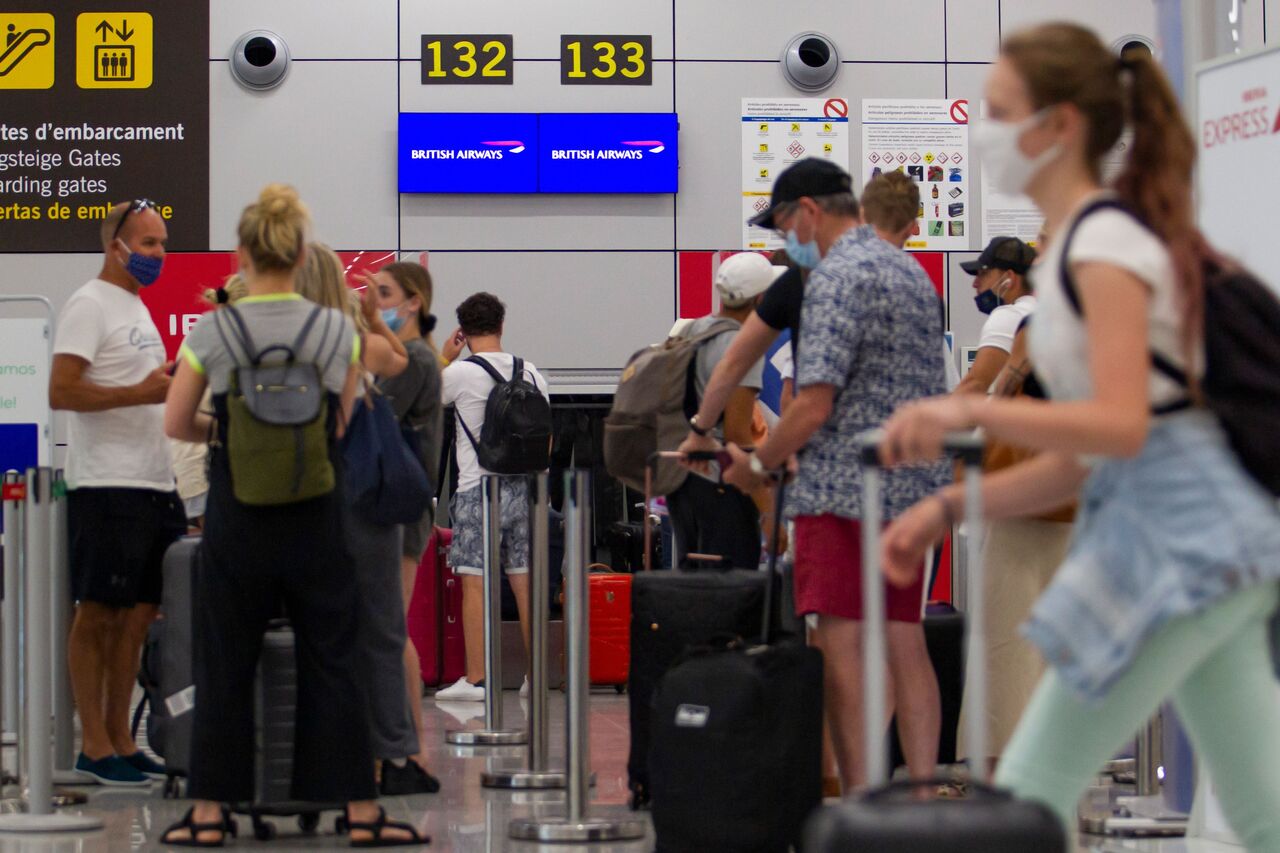Coronavirus pandemic
Border closures to halt virus not sustainable, says WHO
It urges countries to adopt strategies based on local knowledge of virus spread instead
Sign up now: Get ST's newsletters delivered to your inbox

British tourists wait to check in for a flight to London at the airport in Palma de Mallorca on July 27, 2020.
PHOTO: AFP
GENEVA • Keeping borders closed to stop the spread of Covid-19 is unsustainable, the World Health Organisation (WHO) said yesterday, urging countries to adopt comprehensive strategies based on local knowledge of where the virus is spreading.
Border closures and travel restrictions remain an important part of many countries' strategy to combat the pandemic.
At the same time, rising cases in a number of countries in Europe and elsewhere that had loosened measures after appearing to get their outbreaks under control have spurred discussions of possible fresh border closures.
But the United Nations health body warned that such actions cannot be kept up indefinitely, and are useful only when combined with other measures to detect and break chains of transmission.
"Continuing to keep international borders sealed is not necessarily a sustainable strategy for the world's economy, for the world's poor, or for anybody else," Dr Michael Ryan, the director of emergencies at WHO, said during a virtual briefing.
He also said countries should be prepared to tighten or ease measures accordingly. Dr Ryan warned against "releasing pressure" on the virus, which has killed some 650,000 people and infected more than 16.4 million worldwide.
Some nations in Asia imposed new restrictions yesterday and an abrupt British quarantine on travellers from Spain threw Europe's summer reopening into disarray, as the world confronted the prospect of a second wave of infections.
Surges were reported in a number of countries previously singled out as places where the virus was under control.
Australia registered a record daily rise. Vietnam locked down the city of Danang, forcing the evacuation of tens of thousands of visitors.
Mainland China confirmed the most new locally transmitted cases since early March.
India's Covid-19 outbreak is now growing at the fastest rate in the world, increasing 20 per cent over the past week to more than 1.4 million confirmed cases, according to Bloomberg's Coronavirus Tracker.
Infections in the South Asian nation of 1.3 billion people have reached 1.43 million, including 32,771 deaths, India's Health Ministry said, with daily cases close to a record 50,000 yesterday.
India is trailing only the United States and Brazil in the number of confirmed infections, but its growth in new cases is the fastest.
Maharashtra, Tamil Nadu, Andhra Pradesh and Karnataka are among the states which have reported the maximum number of daily cases.
The world's second-most populous country has been ramping up testing, with 515,472 samples taken on Sunday, according to the Indian Council of Medical Research.
Still, India and Brazil have some of the world's lowest testing rates, with 11.8 tests and 11.93 tests per 1,000 people respectively, compared with the US, with 152.98 tests per 1,000, and Russia, with 184.34, according to Our World in Data, a project based at the University of Oxford.
The WHO also said yesterday that a key committee would meet later this week to discuss Covid-19's emergency status, six months after it was declared. Its chief, Dr Tedros Adhanom Ghebreyesus, said the health body's emergency committee would convene to re-examine the declaration that the outbreak constituted a "public health emergency of international concern".
The declaration, which marks the highest level of alarm under international health rules, must be re-evaluated every six months.
Prior to Covid-19, WHO had made such declarations only five times since the International Health Regulations changed in 2007 - for swine flu, polio, Zika and twice for Ebola outbreaks in Africa.
Of those, the current pandemic "is easily the most severe", Dr Tedros said.
Although there is little doubt that the emergency committee will consider that the pandemic still constitutes a global public health emergency, it could alter some of its recommendations on how the WHO and the world should respond.
AGENCE FRANCE-PRESSE, REUTERS, BLOOMBERG


